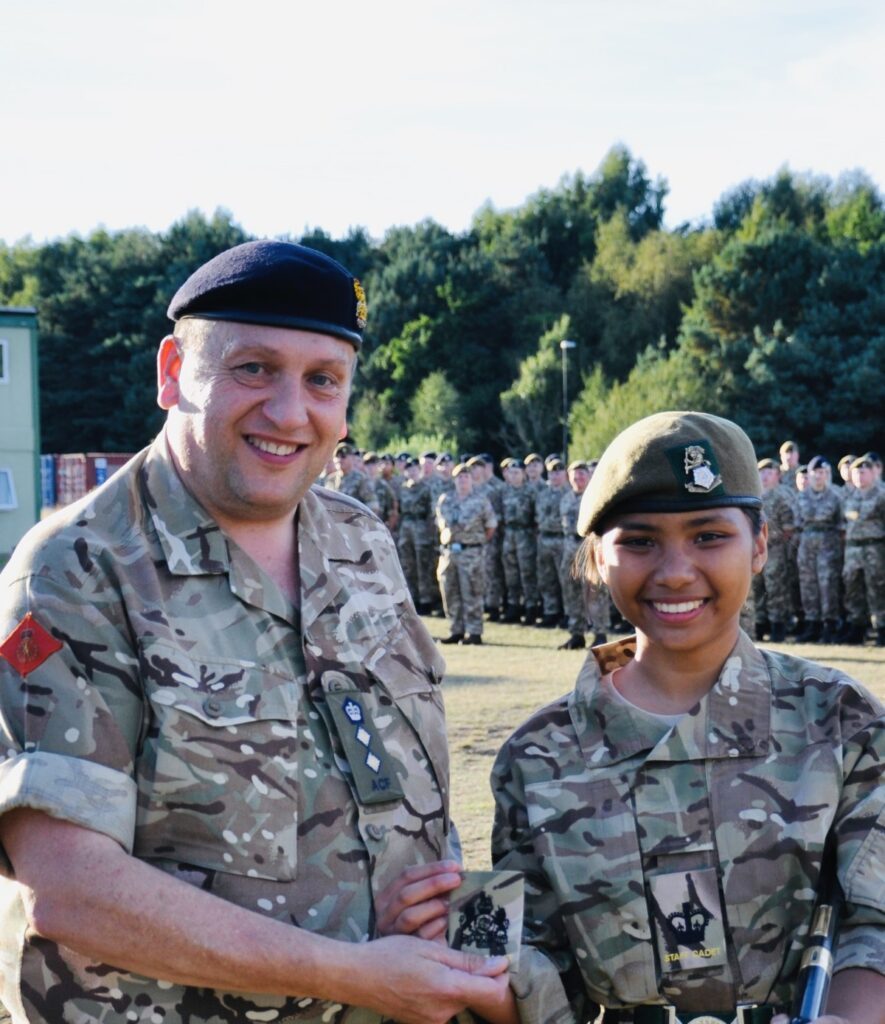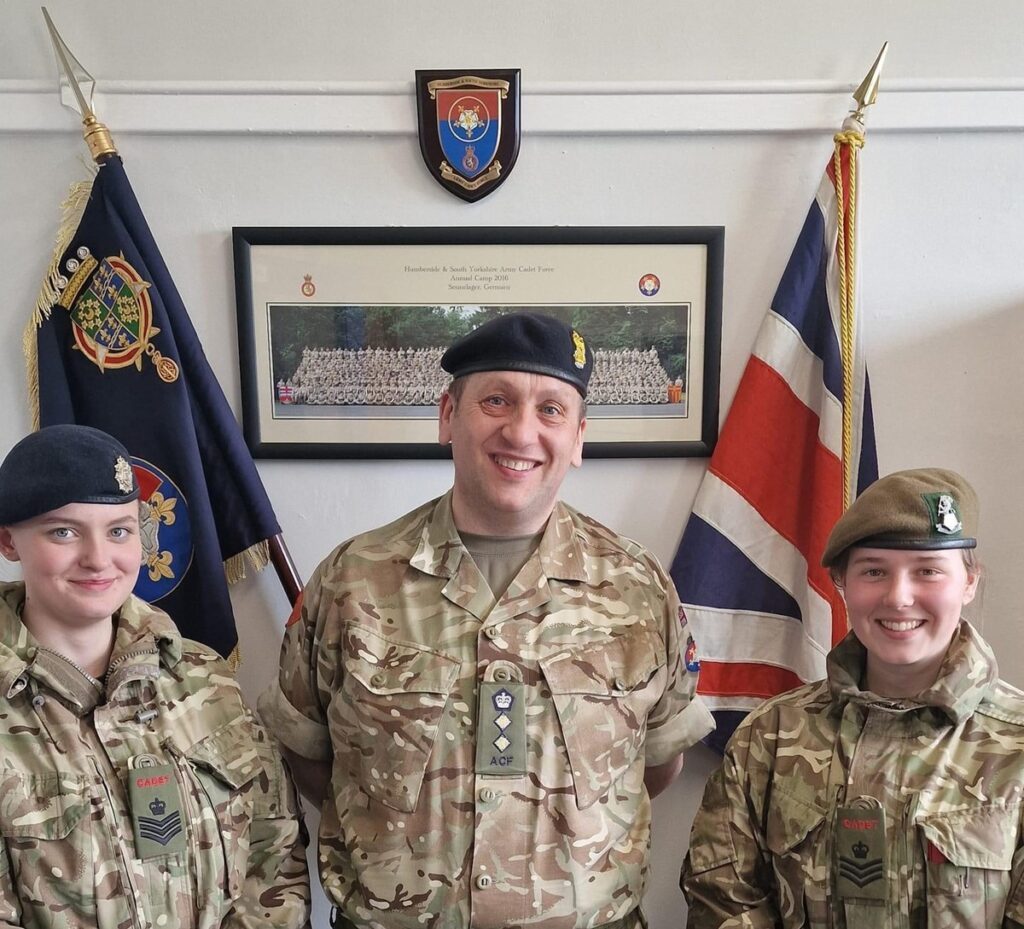
Welcome to this #HeForShe interview with Colonel Fred Owen MStJ, GCGI, the esteemed Commandant of Humberside & South Yorkshire Army Cadet Force (ACF). Colonel Owen’s journey is a testament to resilience, breaking barriers, and embracing diversity. From his humble beginnings in a council estate in Bolton to his current role as Commandant, Colonel Owen has navigated challenges, defied stereotypes, and become a positive role model for all.
Colonel Owen’s career in the ACF began in his hometown of Bolton, Lancashire, where he chose to tread a service path. After joining the Army Cadet Force, he went on to serve in the Regular Army as a Chef, honing skills such as teamwork and leadership. In 1990, Colonel Owen embraced a new chapter in Humberside & South Yorkshire ACF, rising through the ranks and eventually earning the position of Company Sergeant Major.
In 2003, Colonel Owen embarked on a new phase by commissioning, taking on various roles within the ACF, including County First Aid Training Officer and Company Training Officer. His most significant achievement came as Training Major when he planned a transformative experience at Sennelager Camp in Germany for 450 cadets and volunteers.
Beyond his role in the ACF, Colonel Owen has gained extensive strategic and operational knowledge as the Chief Executive for the RSPCA in Hull and East Riding.

Tell us a bit about yourself, background, and your current role?
In the heart of a council estate in Bolton, I began my journey, navigating the challenges of a secondary school while being raised by strict parents. The path I walked was far from ordinary, marked by both adversity and resilience. At the age of 14, I faced the loss of my father, a pivotal moment that would later shape my character and determination.
I joined the Army Cadet Force in my hometown of Bolton, Lancashire. But my story was far from typical, for I chose to tread a service path. Following my school years, I decided to join the Army as a Chef. After a two-year apprenticeship at the Army School of Catering in Aldershot I joined my first unit in London and like many others served across the globe, where I honed skills such as teamwork, leadership and found my calling for service before self.
My journey into the ACF was not just about personal growth; it was a testament to breaking boundaries and defying stereotypes. As I left the Regular Army in 1990, I embraced a new chapter in Humberside & South Yorkshire ACF, where I took command of Hornsea Detachment. The challenges were many, but my determination led me to rise through the ranks, eventually earning the position of Company Sergeant Major.
In 2003, I embarked on a new phase by commissioning, something I never imagined. My journey took me through various roles, from County First Aid Training Officer to Company Training Officer, and I eventually to Command. However, my most significant achievement came as Training Major when I planned the annual camp in 2016, a transformative experience at Sennelager Camp in Germany for 450 cadets and volunteers.
But my story doesn’t end there. I spent five years as Deputy Commandant in HSY, where my role was defined by a commitment to people development, leadership training, and driving organisational change. My service extended to roles like National First Aid Development Officer, Competition Director, Brigade First Aid Advisor, and Panel Chairman. In a constantly evolving environment, I found my strength in adaptability and strategic thinking.
My life outside the ACF is equally fulfilling as the Chief Executive for the RSPCA in Hull and East Riding. I’ve gained extensive strategic and operational knowledge in contract management, healthcare, training, and organisational culture and change. My commitment to community extends to my role as a Trustee for the Hope Sentamu Learning Trust, where I shoulder responsibilities for safeguarding, assurance, and performance.
In my personal life, I cherish the moments with my loving wife Jemma, and together we have three grown-up children—Frederick, Katie, and my stepdaughter Ellen. We have welcomed two precious grandchildren, Isla and Rowen, into our family, not forgetting our trusty Patterdale, Wellington.
My journey has been a testament to resilience, breaking barriers, and embracing diversity. In 2008, I was recognised by HM the Queen and invested as a Member of the Order of St John for my services to first aid in the Cadet Forces. In 2009, I received the HM Lord-Lieutenant Certificate for outstanding voluntary service, underlining the profound impact of my commitment to community and volunteering.
So, this is not just my story; it is a tale of how one can rise above adversity, shatter stereotypes, and chose to have an influence and be a positive role model.
My current role is Commandant of Humberside & South Yorkshire, and I am in the midst of a journey. It’s a journey marked by transformative change, driven by our unwavering commitment to instil values and empower every individual who walks through our doors. As Commandant, I have the privilege of leading this remarkable shift in culture and mindset, and I’d like to share with you the essence of our endeavour.
Our mission is simple yet profound: we are dedicated to creating a values-led culture that defines every facet of our organisation. Integrity, respect, and inclusivity are the guiding principles that underpin our County. I believe that a solid foundation of core values can bring about lasting change. It’s about more than just words; it’s about translating our beliefs into tangible actions and interactions.
I know that our strength lies in our cadets and volunteers who bring their unique backgrounds and experiences to our community. Our role, therefore, extends beyond mere leadership; it’s about empowering each member to discover the best version of themselves. My role is simple, to provide mentorship, guidance, and a supportive framework that encourages personal growth and development. It’s about fostering not only the enhancement of skills but also the cultivation of self-worth and purpose.
In my capacity as Commandant, serve to lead is my true north. It’s a dynamic role that involves managing resources, educating, enabling, and shaping our organisational structure. Yet, at its core, it’s about igniting positive change in the lives of our cadets and volunteers. HSY is more than just an organisation; it’s a community that thrives on inclusivity, shared values, and the collective aspiration to be the best version of ourselves.
• Did you ever sit down and plan your career?
No, I never sat down and meticulously planned my career path, particularly not with the specific goal of reaching the position of Commandant in the ACF. My career journey has been more of an evolving process. As I adapted to the changing dynamics of my family life and advanced in my day job, I gradually discovered the path that led me towards the role of Commandant. What became increasingly clear over time was that my ability to embrace and adapt to positive change played a significant role in my progress. I realised that those around me who were resistant to change slowly faded from view, highlighting the importance of flexibility and openness to new opportunities in achieving career success.

• What one thing do you believe has been a major factor in you achieving success?
The one major factor that has been instrumental in my success in leadership position in our ever-changing, multicultural, multi-generational, and neurodiverse world is my commitment to continuous learning and adaptability. In an era of rapid societal and technological transformations, the ability to remain open to new ideas, diverse perspectives, and emerging trends has proven to be the key to not just surviving but thriving. I believe that my willingness to embrace change, broaden my understanding of diverse cultures and generations, and foster inclusivity for all, including those with neurodiverse backgrounds, has allowed me to lead with effectiveness and relevance in this dynamic environment. My commitment to lifelong learning has enabled me to stay ahead of the curve, bridge generational gaps, and champion diversity and inclusion, ultimately contributing to my success as a leader in a complex and ever-evolving world.
• What challenges have you faced along the way?
Throughout my journey, I’ve encountered several significant challenges that have shaped my experiences and contributed to my personal and professional growth. One notable challenge has been my ongoing struggle with weight and body image. Being consistently overweight presented both physical and emotional hurdles. This struggle not only impacted my health but also led to external stereotyping, negatively affecting my overall well-being.
In addition to the personal challenge of managing my weight, I faced the complexities of navigating a testosterone-fuelled environment. This environment often favoured traditional notions of masculinity and strength, which did not align with my caring, thoughtful, and distinct personality. This divergence from the norm made me susceptible to discrimination and bullying from senior officers who held rigid beliefs about what it meant to be successful in this environment. Their prejudice included statements that I wouldn’t progress in my career because of my weight, illustrating the detrimental impact of stereotypes on my opportunities and self-esteem.
Overcoming these challenges has required resilience, self-acceptance, and a commitment to advocating for diversity and inclusion in all aspects of my life and career. My journey has been a testament to the strength of individual character in the face of adversity, and it has instilled in me a deep passion for promoting equality and fairness for all, irrespective of body size, personality, or gender.
• Do you believe the ACF is where it needs to be in terms of gender equality and why?
The journey toward gender equality within the Army Cadet Force has undoubtedly seen considerable progress, and it’s crucial to acknowledge the positive steps that have been taken. In a historical context where the ACF had a male membership and leadership structure, the ACF has actively worked to increase female participation and provide leadership opportunities for women. These efforts reflect the broader societal trend toward more inclusive and diverse organisation.
However, it is essential to recognise that the mission of achieving gender equality is ongoing and doesn’t and shouldn’t have an end state. Challenges persist, including the need to ensure equitable representation at all levels and address any lingering biases or stereotypes. Achieving true parity requires sustained commitment and vigilance to create a culture that embraces diversity, values all its members, and offers equal opportunities to thrive.
Gender equality is a journey that demands ongoing effort and dedication. While considerable progress has been made, the ACF, like many organisations, should continue to assess and address gender equality concerns. By doing so, they can ensure that every individual, regardless of their gender, has the same opportunities to excel and lead within the organisation. Gender equality is not a destination but an ongoing commitment to creating a fair and inclusive environment for all.
• How has gender equality progressed in the ACF over the past 5 years and what positive changes have you seen?
In recent years, there has been a notable increase in the participation of female adult volunteers and cadets within the ACF. More young women are joining cadet units and actively engaging in leadership and training opportunities. Efforts have been made to promote diversity in leadership roles within the ACF. Women are increasingly taking on leadership positions, both as cadet instructors and adult volunteers, breaking down barriers and serving as role models for other cadets.
The ACF actively promote gender equality and diversity. This includes creating gender-inclusive facilities, ensuring non-discrimination, and providing equal access to opportunities for all cadets. There is more training to incorporated gender awareness and diversity training for their cadets and adult volunteers, helping to increase awareness of gender-related issues and promoting a more inclusive environment. The ACF has increasingly recognised and celebrated the achievements of female cadets and volunteers, providing well-deserved acknowledgment for their contributions.
Gender equality remains a key focus within the ACF, with a commitment to continually improving policies and practices to create a more inclusive and equitable organisation.
• What barriers do you feel are still the most challenging for women in the ACF?
In the Army Cadet Force, women face several persistent challenges, despite considerable progress in promoting gender equality. One of the most enduring barriers is the prevalence of gender stereotypes and biases that can affect how women are perceived and treated within the Cadet Forces. These stereotypes often lead to limited opportunities interestingly, less for female cadets and adult volunteers, as they may be unfairly seen as less capable or less suited for certain roles. Overcoming these stereotypes and biases is an ongoing challenge that requires education and cultural change within the ACF.
Another significant challenge for women in the ACF is the underrepresentation of females in leadership and decision-making roles. While there have been efforts to encourage more women to take on leadership positions, the gender gap in leadership remains a persistent issue. This underrepresentation can deter female Cadet Force Adult Volunteers from aspiring to leadership roles and may perpetuate the perception that leadership in the ACF is predominantly a male domain. To address this challenge, it’s crucial to actively promote and support women in leadership roles, provide mentorship and leadership training, and create an inclusive and supportive environment where women can thrive and advance within the Army Cadet Force

• What are we missing out on by not maximizing the talents of both genders within the ACF?
By not maximizing the talents of all genders within the Army Cadet Force (ACF), we are missing out on a wealth of diverse skills, perspectives, and leadership potential that could significantly enhance the ACF’s effectiveness and resilience. Gender should never be a limiting factor in determining an individual’s capacity to contribute to the ACF. When we fail to fully embrace and support the talents of both men and women, we deprive the ACF of the unique skills and viewpoints that each gender can offer. Achieving gender equality in the ACF not only promotes fairness and inclusion but also results in a more dynamic and innovative force, better equipped to tackle the multifaceted challenges of cadet training and leadership development. Moreover, maximizing the talents of both genders fosters a stronger sense of community, teamwork, and cohesion within the ACF, ultimately benefiting the ACF’s overall success and its ability to inspire and empower the cadets it serves.
• Why do you think some men shy away from becoming involved with gender equality?
Some men may shy away from getting involved in gender equality efforts due to factors such as a lack of awareness about the extent of gender inequality, fear of change, misconceptions about gender equality’s goals, societal pressures, concerns about backlash, and a level of comfort with the status quo. They might also be unfamiliar with the topic, not see direct personal incentives for involvement, or may not have been exposed to gender equality discussions in their upbringing.
• How have you personally been involved in the fight for gender diversity?
In my role as a leader within the Army Cadet Force and my broader career in the voluntary sector, I’ve been deeply committed to promoting gender diversity and working to eliminate misogyny. This commitment stems from a belief in the fundamental principles of equality, respect, and inclusivity.
One of the most impactful ways I’ve contributed to the fight for gender diversity is by fostering an inclusive environment within the ACF. This includes advocating for policies and practices that ensure equal opportunities for both male and female cadets and volunteers. By eliminating any gender-based discrimination, we’ve worked to create a space where all individuals, regardless of their gender, feel valued and can thrive.
Another crucial aspect of my involvement has been the active promotion of female leaders within the ACF. This has included providing mentorship, coaching, and guidance to women in the organisation, enabling them to take on leadership roles. By empowering female cadets and volunteers, we challenge gender stereotypes and pave the way for a more balanced representation at all levels.
Misogyny has no place in any organisation or society, and I have consistently and vocally challenged it when encountered. Whether it’s addressing derogatory language, discriminatory behaviour, or stereotyping, I’ve made it clear that such attitudes are unacceptable. By standing up against misogyny and holding individuals accountable for their actions, we send a strong message that this behaviour will not be tolerated within our ranks.
I’ve actively supported and championed initiatives aimed at promoting gender equality and diversity. These initiatives include awareness campaigns, training programs, and policy changes that are designed to address gender-based challenges and create a more inclusive and diverse ACF.
Beyond my role in the ACF, I’ve taken steps to promote mental health awareness and support, even engaging with menopause support groups as a male ally. My involvement in these initiatives reflects a commitment to addressing issues that disproportionately affect women and promoting a culture of empathy and understanding.
My personal involvement in the fight for gender diversity and against misogyny is rooted in the belief that true progress is achieved when we create an environment where all individuals are valued, respected, and empowered to reach their full potential. It’s a journey that demands ongoing commitment and effort, and I’m proud to be a part of this transformative process within the ACF and in broader society.
• What positive steps have you taken to encourage more women to make their mark within the ACF?
In my role as Commandant, I’ve been dedicated to taking positive steps to encourage more women to make their mark within the Army Cadet Force. Recognising the importance of gender diversity and inclusivity, I’ve implemented several initiatives and strategies to empower female leaders and provide them with equal opportunities to excel within my areas.
One of the fundamental steps I’ve taken is actively promoting and appointing female leaders to senior command positions within the ACF. This move has been instrumental in breaking down historical barriers and ensuring that talented women have the chance to lead and influence our organisation. By providing female leaders with these opportunities, we send a powerful message about the value of their contributions.
It’s not just about providing leadership positions but also ensuring that female leaders have equal access to development opportunities. I’ve made it a priority to offer training and growth prospects that parallel those provided to their male counterparts. This means that female leaders can attend leadership courses and gain experiential knowledge that allows them to thrive within the ACF.
To further support the development of female leaders, I’ve facilitated their attendance at specialised “Women in Leadership” courses. These courses empower women with the knowledge and skills necessary to excel in leadership roles, helping them build confidence and capabilities. Beyond formal training, I’ve encouraged experiential learning for female leaders. This involves hands-on experience and mentorship, which can be invaluable in honing leadership skills. It allows them to learn from their male counterparts and gain insights from diverse perspectives.
I’ve aimed to create an environment within the ACF where gender is not a barrier to success. We want every talented and dedicated individual, regardless of their gender, to feel welcome, supported, and inspired to reach their full potential. These positive steps are part of our ongoing commitment to promoting gender diversity and inclusivity in the ACF, ensuring that all members have the opportunity to make their mark and contribute to our collective success.





Responses